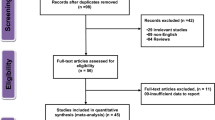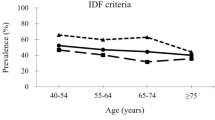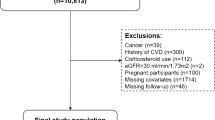Abstract
Limited evidence is available on the risk differences in the development of stroke subtypes in relation to particular clustering patterns of the metabolic syndrome (MetS) components. A follow-up study of a Chinese cohort involving 10 292 individuals was performed to assess the roles of cluster patterns of the MetS components in the prediction of incident stroke subtypes. During follow-up, there were 161 incident cases of ischemic strokes and 41 incident cases of hemorrhagic strokes. Among MetS components, only the hypertensive trait was associated with significantly elevated risks of both ischemic and hemorrhagic strokes. Furthermore, MetS with hypertension as components was associated with increased risk of ischemic and hemorrhagic strokes (adjusted hazards ratio (95% confidence interval) was 2.96 (1.94–4.50) and 2.93 (1.25–6.90), respectively) as compared with those who had neither hypertension nor MetS. Notably, as the number of the MetS components increased, the risk of ischemic stroke significantly and dose-dependently increased. This implies a cumulative effect of MetS components in elevating the risk of ischemic stroke. These findings suggest that MetS comprises heterogenous clusters with respect to the risk of developing the subtype of stroke.
This is a preview of subscription content, access via your institution
Access options
Subscribe to this journal
Receive 12 digital issues and online access to articles
$119.00 per year
only $9.92 per issue
Buy this article
- Purchase on Springer Link
- Instant access to full article PDF
Prices may be subject to local taxes which are calculated during checkout

Similar content being viewed by others
References
Feigin VL, Lawes CMM, Bennett DA, Anderson CS . Stroke epidemiology: a review of population-based study of incidence, prevalence, and case-fatality in the late 20th century. Lancet Neurol 2003; 2: 43–53.
Khaw KT . Epidemiology of stroke. J Neurol Neurosurg Psychiatry 1996; 61: 333–338.
National Health Administration, Executive Yuan, Republic of China. Health Statistics: I. Vital statistics, 1976-2011.
Hu HH, Sheng WY, Chu FL, Lan CF, Chiang BN . Incidence of stroke in Taiwan. Stroke 1992; 23: 1237–1241.
Alberti KG, Eckel RH, Grundy SM, Zimmet PZ, Cleeman JI, Donato KA et al. Harmonizing the metabolic syndrome: a joint interim statement of the international diabetes federation task force on epidemiology and prevention; national heart, lung, and blood institute; american heart association; world heart federation; international atherosclerosis society; and international association for the study of obesity. Circulation 2009; 120: 1640–1645.
Eckel RH, Grundy SM, Zimmet PZ . The metabolic syndrome. Lancet 2005; 365: 1415–1428.
Towfighi A, Ovbiagele B . Metabolic syndrome and stroke. Curr Diabetes Rep 2008; 8: 37–41.
Kurl S, Laukkanen JA, Niskanen L, Laaksonen D, Sivenius J, Nyyssonen K et al. Metabolic syndrome and the risk of stroke in middle-aged men. Stroke 2006; 37: 806–811.
Chen HJ, Bai CH, Yeh WT, Chiu HC, Pan WH . Influence of metabolic syndrome and general obesity on the risk of ischemic stroke. Stroke 2006; 37: 1060–1064.
Iso H, Sato S, Kitamura A, Imano H, Kiyama M, Yamagishi K et al. Metabolic syndrome and the risk of ischemic heart disease and stroke among Japanese men and women. Stroke 2007; 38: 1744–1751.
Boden-Albala B, Sacco RL, Lee HS, Grahame-Clarke C, Rundek T, Elkind MV et al. Metabolic syndrome and ischemic stroke risk: Northern Manhattan Study. Stroke 2008; 39: 30–35.
Rodriguez-Colon SM, Mo J, Duan Y, Liu J, Caulfield JE, Jin X et al. Metabolic syndrome clusters and the risk of incident stroke: The Atherosclerosis Risk in Communities (ARIC) Study. Stroke 2009; 40: 200–205.
Yang T, Chu CH, Bai CH, You SL, Chou YC, Chou WY et al. Uric acid as a risk marker for metabolic syndrome: a Chinese cohort study. Atherosclerosis 2012; 220: 525–531.
Yang T, Chu CH, Bai CH, You SL, Chou YC, Hwang LC et al. Uric acid concentration as a risk marker for blood pressure progression and incident hypertension: a Chinese cohort study. Metabolism 2012; 61: 1747–1755.
Lu TH, Chang HY, Hwu CM, Chiu HC, Yin WH, Pan WH . Comparison of official coders versus physician panel in assignment of underlying cause of death. J Formos Med Assoc 2001; 100: 365–369.
Wen CP, Tsai SP, Chung WS. A . 10-year experience with universal health insurance in Taiwan: measuring changes in health and health disparity. Ann Intern Med 2008; 148: 258–267.
Woo D, Haverbusch M, Sekar P, Kissela B, Khoury J, Schneider A et al. Effect of untreated hypertension on hemorrhagic stroke. Stroke 2004; 35: 1703–1708.
Zhang WW, Liu CY, Wang YJ, Xu ZQ, Chen Y, Zhou HD . Metabolic syndrome increases the risk of stroke: a 5-year follow-up study in a Chinese population. J Neurol 2009; 256: 1493–1499.
Qiao Q, Laatikainen T, Zethelius B, Stegmayr B, Eliasson M, Jousilahti P et al. Comparison of definitions of metabolic syndrome in relation to the risk of developing stroke and coronary heart disease in Finnish and Swedish cohorts. Stroke 2009; 40: 337–343.
Iribarren C, Go AS, Husson G, Sidney S, Fair JM, Quertermous T et al. Metabolic syndrome and early-onset coronary artery disease: is the whole greater than its parts? J Am Coll Cardiol 2006; 48: 1800–1807.
Hanefeld M, Koehler C, Gallo S, Benke I, Ott P . Impact of the individual components of the metabolic syndrome and their different combinations on the prevalence of atherosclerotic vascular disease in type 2 diabetes: the Diabetes in Germany (DIG) study. Cardiovasc Diabetol 2007; 6: 13–19.
Handa N, Matsumoto M, Maeda H, Hougaku H, Kamada T . Ischemic stroke events and carotid atherosclerosis: results of the Osaka Follow-up Study for Ultrasonographic Assessment of Carotid Atherosclerosis (the OSACA Study). Stroke 1995; 26: 1781–1786.
Magai Y, Kitagawa K, Sakaguchi M, Shimizu Y, Hashimoto H, Yamagami H et al. Significance of earlier carotid atherosclerosis for stroke subtypes. Stroke 2001; 32: 1780–1785.
Wolf PA, Abbott RD, Kannel WB . Atrial fibrillation as an independent risk factor for stroke: the Framingham Study. Stroke 1991; 22: 983–988.
Acknowledgements
The authors thank the Bureau of Health Promotion, Department of Health for administrative support and nurses at study areas for data collection. Sources of funding: This study was supported by a grant from the Bureau of Health Promotion, Department of Health (DOH-95-HP-2103), Executive Yuan, Taiwan, Republic of China.
Disclaimer
The sponsor had no role in study design, collection, analysis and interpretation of data; writing the report and the decision to submit the report for publication.
Author information
Authors and Affiliations
Corresponding author
Ethics declarations
Competing interests
The authors declare no conflict of interest.
Rights and permissions
About this article
Cite this article
Chen, YC., Sun, CA., Yang, T. et al. Impact of metabolic syndrome components on incident stroke subtypes: a Chinese cohort study. J Hum Hypertens 28, 689–693 (2014). https://doi.org/10.1038/jhh.2013.152
Received:
Revised:
Accepted:
Published:
Issue Date:
DOI: https://doi.org/10.1038/jhh.2013.152
Keywords
This article is cited by
-
Comparison Between Metabolic Syndrome and the Framingham Risk Score as Predictors of Cardiovascular Diseases Among Kazakhs in Xinjiang
Scientific Reports (2018)
-
Metabolic syndrome and the short-term prognosis of acute ischemic stroke: a hospital-based retrospective study
Lipids in Health and Disease (2015)



